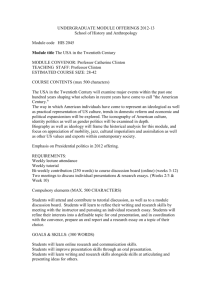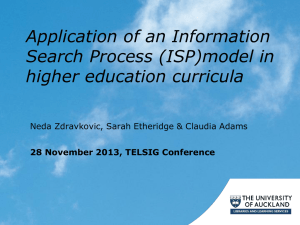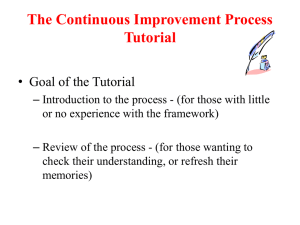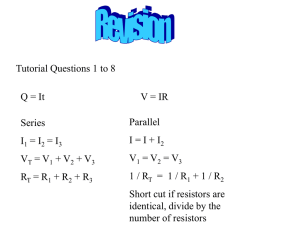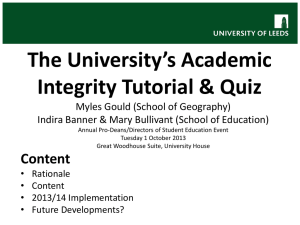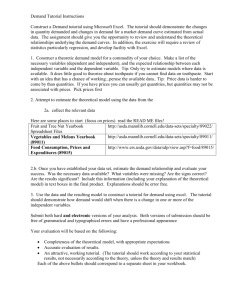History Department
advertisement
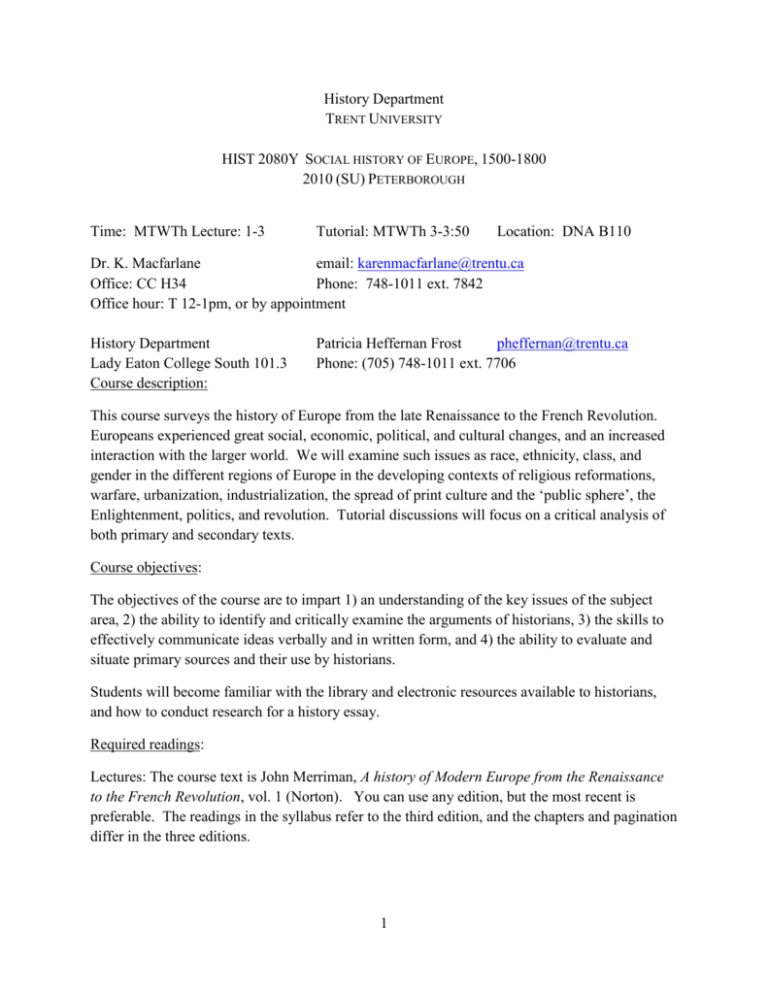
History Department TRENT UNIVERSITY HIST 2080Y SOCIAL HISTORY OF EUROPE, 1500-1800 2010 (SU) PETERBOROUGH Time: MTWTh Lecture: 1-3 Tutorial: MTWTh 3-3:50 Location: DNA B110 Dr. K. Macfarlane email: karenmacfarlane@trentu.ca Office: CC H34 Phone: 748-1011 ext. 7842 Office hour: T 12-1pm, or by appointment History Department Lady Eaton College South 101.3 Course description: Patricia Heffernan Frost pheffernan@trentu.ca Phone: (705) 748-1011 ext. 7706 This course surveys the history of Europe from the late Renaissance to the French Revolution. Europeans experienced great social, economic, political, and cultural changes, and an increased interaction with the larger world. We will examine such issues as race, ethnicity, class, and gender in the different regions of Europe in the developing contexts of religious reformations, warfare, urbanization, industrialization, the spread of print culture and the ‘public sphere’, the Enlightenment, politics, and revolution. Tutorial discussions will focus on a critical analysis of both primary and secondary texts. Course objectives: The objectives of the course are to impart 1) an understanding of the key issues of the subject area, 2) the ability to identify and critically examine the arguments of historians, 3) the skills to effectively communicate ideas verbally and in written form, and 4) the ability to evaluate and situate primary sources and their use by historians. Students will become familiar with the library and electronic resources available to historians, and how to conduct research for a history essay. Required readings: Lectures: The course text is John Merriman, A history of Modern Europe from the Renaissance to the French Revolution, vol. 1 (Norton). You can use any edition, but the most recent is preferable. The readings in the syllabus refer to the third edition, and the chapters and pagination differ in the three editions. 1 Tutorials: Additional secondary readings will be available through the library e-resources. Primary source readings will be available on the course website, through the library e-resources, or through the internet links posted in the course document ‘Primary source readings’. A bibliography of suggested further readings is posted on the course website. Important dates: 24 May 25 May 31 May 3 June 14 June Victoria Day – no class Essay proposal/annotated bibliography due In-class test Last date to withdraw without academic penalty Essay due Course requirements Tutorial participation 20% In-class test 15% Essay proposal and 10% annotated bibliography Essay 25% Final exam 30% Essay: Students will write a 2,500 word essay. There must be a central argument – this is not a narrative. It is due at the beginning of lecture on 14 June. Policy on Late Assignments In case of exceptional circumstances you must notify the instructor immediately. A doctor’s note is absolutely necessary. No extensions will be given for other reasons. Late assignments will be penalized three percentage points a day, seven days a week. No assignments will be accepted five days after the due date or after 14 June. Academic Integrity Academic dishonesty, which includes plagiarism and cheating, is an extremely serious academic offence and carries penalties varying from a 0 grade on an assignment to expulsion from the University. Definitions, penalties, and procedures for dealing with plagiarism and cheating are set out in Trent University’s Academic Integrity Policy. You have a responsibility to educate yourself – unfamiliarity with the policy is not an excuse. You are strongly encouraged to visit Trent’s Academic Integrity website to learn more – www.trentu.ca/academicintegrity. 2 Access to Instruction It is Trent University’s intent to create an inclusive learning environment. If a student has a disability and/or health consideration and feels that he/she may need accommodations to succeed in this course, the student should contact the Disability Services Office (BL Suite 109, 748-1281, disabilityservices@trentu.ca) as soon as possible. Complete text can be found under Access to Instruction in the Academic Calendar. Please see the Trent University academic calendar for University Diary dates, Academic Information and Regulations, and University and departmental degree requirements. Course Communications Students should communicate with the instructor in person during scheduled office hours or by appointment. The instructor will attempt to reply to e-mails within 72 hours (excluding weekends). However, e-mails asking for information which was discussed in lecture or which are vague will not receive a response. Trent University e-mail accounts must be used and there must be a subject. E-mails without a subject heading will not be opened. It is the student’s responsibility to ensure that her/his questions/requests are addressed. If a student does not receive a response to an e-mail it is up to her/him to seek a resolution to her/his problem by coming during posted office hours. Lecture and Tutorial schedule: 10 May Introduction 11 May Europe and Europeans in 1500 Lecture reading: Merriman, ch. 2 The Renaissance. 12 May Social orders Lecture reading: Merriman, ch. 1 Medieval legacies and transforming discoveries Tutorial: Preparing and researching a history essay. 13 May Life, death, and disease Tutorial reading: Andrew B. Appleby, ‘Epidemics and famine in the little ice age,’ Journal of Interdisciplinary History 10, no. 4 (Spring 1980): 643-63. [jstor] Accidents and deaths in England http://www.rictornorton.co.uk/grubstreet/accident.htm 3 Social conditions in seventeenth-century France http://www.fordham.edu/halsall/mod/17francesoc.html 17 May Gender and sex Tutorial reading: Katrina Honeyman and Jordan Goodman, ‘Women’s work, gender conflict, and labour markets in Europe, 1500-1900,’ Economic History Review 44, no. 4 (1991): 608-614. 18 May Reformations in religious life Lecture reading: Merriman, ch. 3. Tutorial: Viewing and discussion of Episode 3 of The Secret Files of the Inquisition 19 May Revolutions in war and religion Lecture reading: Merriman, ch. 4. Tutorial reading: Natalie Zemon Davis, ‘The rites of violence: religious riot in sixteenth-century France,’ Past and Present 59, no. 1 (May 1973): 51-91. 20 May Europe and the world in the sixteenth and seventeenth centuries Lecture reading: Merriman, pp. 165-178, 195-198. Tutorial readings: see course website. 24 May ***Victoria Day*** 25 May Absolutism: court culture, intrigue, politics, and propaganda Essay proposal/annotated bibliography due Lecture reading: Merriman, ch. 7. Tutorial readings: ‘Primary source readings’ on course website. 26 May The Dutch golden age Lecture reading: Merriman, pp. 198-207, 231-241. Jan de Vries, ‘Luxury and Calvinism/luxury and capitalism: supply and demand for luxury goods in the seventeenth-century Dutch Republic?’ The Journal of the Walters Art Gallery 57 (1999): 73-85. [jstor] 27 May England’s troubles Lecture reading: Merriman, pp. 179-195, 208-231. 4 Tutorial readings: see course website. 31 May In-class test (no tutorial) 1 June Peasants and enlightened despots Lecture reading: Merriman, pp. 336-346. Tutorial readings: ‘Primary source readings’ on course website. 2 June Eighteenth-century states and wars Lecture reading: Merriman, ch. 11. Tutorial readings: see course website. 3 June Europe and the world in the eighteenth century Tutorial readings: ‘Primary source readings’ on course website. 7 June Luxury, consumption, and material culture Tutorial reading: Beverly Lemire, ‘The theft of clothes and popular consumerism in early modern England’ Journal of Social History 24, no. 2, (1990): 255-76. 8 June Minorities in Europe Tutorial reading: Gabriel Banat, ‘Le Chevalier de Saint-Georges, man of music and gentlemanat-arms: the life and times of an eighteenth-century prodigy,’ Black music research journal 10, no. 2 (1990): 177-212. Ignore the technical writing about music (pp. 192-3). [jstor] 9 June Popular protest and culture Tutorial reading: Rudolf M. Dekker, ‘Women in revolt: popular protest and its social basis in Holland in the seventeenth and eighteenth centuries,’ Theory and Society 16 (1987): 337-62. 10 June Urban and rural life: poverty and proto-industrialization Lecture reading: Merriman, ch. 10. Tutorial readings: ‘Primary source readings’ on course website. 14 June The Enlightenment Essay due (no tutorial) Lecture reading: Merriman, ch. 9. 15 June Communication and the ‘public sphere’ 5 Lecture reading: Merriman, pp. 286-7. Tutorial readings: ‘Primary source readings’ on course website. 16 June Scientific revolutions Lecture reading: Merriman, ch. 8. Tutorial readings: ‘Primary source readings’ on course website. 17 June The French Revolution Lecture reading: Merriman, ch. 12. Tutorial: Exam review 6

